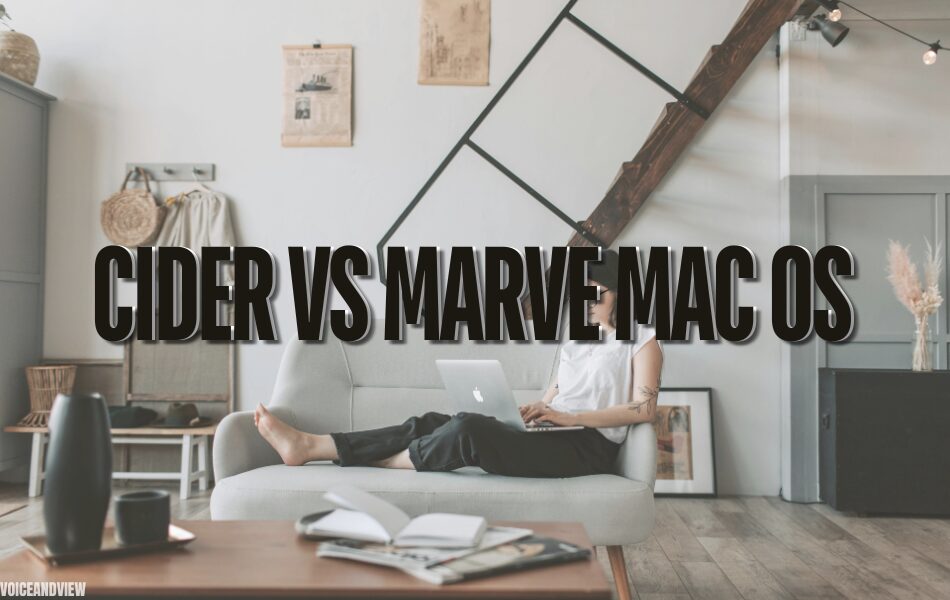Cider vs Marve Mac OS: Ultimate macOS Alternative Showdown

The digital landscape is teeming with operating systems, each promising a unique computing experience. Among the rising stars challenging the macOS monopoly are Cider and Marve. But which one truly delivers? This article delves into a comprehensive comparison of Cider vs Marve Mac OS, examining their core features, performance, compatibility, and more. Our aim is to equip you with the knowledge to make an informed decision about the best macOS alternative for your needs. We’ll explore what these operating systems offer, where they excel, and where they might fall short.
Let’s embark on this journey to uncover the strengths and weaknesses of Cider vs Marve Mac OS.
Contents
Cider: A Deep Dive
Cider, a relatively new entrant in the macOS alternative arena, has garnered attention for its unique approach to computing. Understanding its foundation is crucial for appreciating its strengths and limitations.
Cider’s journey began as an open-source project with a core focus on performance and compatibility. It has evolved into a full-fledged operating system, attracting developers and users seeking a macOS-like experience with a twist. Cider’s core features revolve around a streamlined interface, robust multitasking capabilities, and a commitment to open standards. While it appeals to a broad audience, Cider particularly resonates with developers, power users, and those who value customization.
Cider’s standout features include its lightning-fast boot times, efficient resource management, and seamless integration with popular productivity tools. The operating system boasts impressive performance benchmarks, rivaling and even surpassing macOS in certain areas. Cider’s compatibility with macOS applications and hardware is another major selling point, easing the transition for users switching from Apple’s ecosystem.
However, no operating system is without its challenges. Cider, while promising, still has room for improvement. Some users report minor stability issues and occasional compatibility hiccups with certain niche software. Additionally, Cider’s app ecosystem, though growing, is not as extensive as macOS or Windows, which could limit software choices for some users.
It’s essential to weigh these factors carefully. Cider offers a compelling proposition for those prioritizing performance and customization, but users heavily reliant on specific software might encounter limitations.
Marve: A Comprehensive Look
Marve, another significant contender in the macOS alternative landscape, presents a distinct approach to computing. Understanding its origins and core principles is essential for evaluating its suitability as a macOS replacement.
Emerging from a community-driven development model, Marve has evolved into a mature operating system with a strong emphasis on user experience and privacy. Its core features include a clean interface, robust security measures, and a focus on energy efficiency. Marve’s target audience encompasses a wide range of users, from casual computer users to privacy-conscious individuals and creative professionals.
Marve’s strengths lie in its user-centric design, which prioritizes simplicity and intuitiveness. The operating system often receives praise for its attention to detail and its ability to adapt to user preferences. Performance-wise, Marve delivers a smooth and responsive experience, with efficient resource management contributing to its overall efficiency. Additionally, Marve’s commitment to privacy has earned it a loyal following among users concerned about data protection.
While Marve excels in many areas, it’s essential to acknowledge its limitations. Some users might find the operating system’s default customization options to be less extensive than those offered by competitors. Additionally, while Marve’s app ecosystem is growing, it may not yet match the breadth and depth of macOS or Windows.
Ultimately, the decision to choose Marve depends on individual priorities. Users seeking a privacy-focused, user-friendly operating system with solid performance may find Marve to be an excellent choice. However, those who require a vast array of software options or extensive customization capabilities might want to explore other alternatives.
Cider vs Marve Mac OS: A Feature-by-Feature Comparison
Directly comparing Cider vs Marve Mac OS across key features offers valuable insights for potential users. This section delves into the nuances of user interface, performance, compatibility, and other critical aspects.
User Interface
The user interface is the gateway to any operating system. Cider opts for a minimalist aesthetic with a focus on functionality. Its interface is clean and intuitive, appealing to users who prioritize efficiency. Customization options are available but lean towards the technical side. In contrast, Marve embraces a more visually appealing design with attention to detail. Its interface is often described as user-friendly, offering a balance of aesthetics and usability. Marve provides a wider range of customization choices, catering to users who enjoy personalizing their computing environment.
Performance
Performance is a critical factor for many users. Cider has consistently demonstrated strong performance metrics, particularly in tasks demanding processing power. Its efficient resource management contributes to snappy responsiveness and smooth multitasking. Marve also delivers solid performance, with a focus on optimizing battery life. While it might not match Cider’s raw speed in all benchmarks, Marve excels in handling everyday tasks and multimedia applications.
Compatibility
Compatibility with macOS applications and hardware is essential for a seamless transition. Cider has made significant strides in this area, offering compatibility with a wide range of macOS software and peripherals. However, there might be occasional compatibility issues with niche applications or older hardware. Marve also prioritizes compatibility but might have limitations when dealing with highly specialized macOS software. Both operating systems continuously work on expanding their compatibility lists.
App Store and Ecosystem
The availability of apps and software significantly impacts user experience. Cider’s app store is growing rapidly, offering a diverse range of applications. However, it might still lack some popular macOS apps. Marve’s app ecosystem is smaller but focuses on quality over quantity. While it may not have the same breadth as Cider or macOS, Marve’s curated app store often features high-quality, privacy-centric software.
Stability and Reliability
A stable and reliable operating system is crucial for productivity. Both Cider vs Marve Mac OS have made strides in improving system stability and reliability. However, users occasionally report system crashes or freezes on both platforms. It’s essential to consider individual experiences and the specific hardware configuration when evaluating stability.
Security
Security is a paramount concern in today’s digital landscape. Both Cider vs Marve Mac OS prioritize user privacy and data protection. They incorporate robust security features, including firewalls, malware protection, and encryption. However, the specific security measures and their effectiveness can vary. It’s advisable to research the latest security updates and practices for both operating systems.
Battery Life
Battery life is a critical factor for laptop users. While Cider vs Marve Mac OS both offer power-saving features, their battery performance can vary depending on hardware, usage patterns, and specific settings. Factors like screen brightness, background processes, and workload intensity impact battery life. It’s recommended to refer to independent battery life tests for the most accurate comparisons.
Which One is Right for You?
Choosing between Cider vs Marve Mac OS ultimately depends on individual needs and preferences. Let’s explore some common user profiles and how these operating systems might fit their requirements.
Understanding Your Needs
A casual user primarily interested in web browsing, email, and social media might find both Cider vs Marve Mac OS suitable. However, Marve’s emphasis on user-friendliness could offer a slightly smoother experience. For power users demanding high performance, extensive customization options, and compatibility with specialized software, Cider might be a better fit. Content creators seeking a visually appealing environment with strong multimedia capabilities could lean towards Marve. Privacy-conscious individuals might find Marve’s focus on security appealing.
Key Decision Factors
When making a choice, consider these key factors:
- User Interface: Prioritize a sleek, intuitive interface or extensive customization options?
- Performance: Does raw processing power or efficient resource management matter more?
- Compatibility: Is compatibility with existing macOS software and hardware crucial?
- App Ecosystem: Is a vast app library essential, or do you prefer a curated selection?
- Security and Privacy: How important are robust security features and data protection?
- Cost: Evaluate the pricing models of both operating systems.
Tailored Recommendations
Based on these factors, here are some recommendations:
- Casual Users: Marve’s user-friendly interface and solid performance make it a strong contender.
- Power Users: Cider’s performance and customization options might align better with their needs.
- Content Creators: Marve’s visually appealing interface and multimedia capabilities could be advantageous.
- Privacy Advocates: Marve’s focus on security and privacy makes it a compelling choice.
- Budget-Conscious Users: Consider the pricing models of both operating systems before making a decision.
Ultimately, the best way to determine which operating system is right for you is to try them out. Many operating systems offer trial versions or virtual machine options, allowing you to experience their features firsthand.
By carefully considering your priorities and exploring both Cider vs Marve Mac OS, you can make an informed decision that enhances your computing experience.
Conclusion
The choice between Cider vs Marve mac OS alternative is multifaceted, hinging on individual preferences and specific needs. Both operating systems have made significant strides in offering compelling options for users seeking to break free from the Apple ecosystem. Cider excels in performance and customization, while Marve prioritizes user experience and privacy.
The future of both Cider vs Marve Mac OS is promising. As technology continues to evolve, we can expect further refinements, expanded feature sets, and increased competition. The dynamic nature of the operating system landscape ensures that users will have an array of choices to suit their evolving needs.
We encourage you to share your experiences with Cider or Marve in the comments below. Your insights can be invaluable to other readers considering these macOS alternatives. Feel free to ask questions if you need further clarification or have specific concerns.
By engaging in open dialogue, we can collectively contribute to a deeper understanding of these operating systems and help others make informed decisions.
FAQs: Cider vs Marve Mac OS
Q- Is Cider or Marve Better for Casual Users?
Both Cider vs Marve Mac OS offer user-friendly experiences. However, Marve’s emphasis on simplicity and intuitive design might give it a slight edge for casual users. Ultimately, the best way to decide is to try both operating systems.
Q- Which Operating System is Faster, Cider or Marve?
Cider generally boasts superior raw performance, especially in demanding tasks. Marve, while not as fast, offers efficient resource management, resulting in a smooth overall experience.
Q- Can I Run Most macOS Apps on Cider or Marve?
Both Cider vs Marve Mac OS strive for compatibility with macOS applications. While Cider often leads in this area, there might be exceptions. It’s essential to check compatibility before making a switch.
Q- Are Cider vs Marve Mac OS Secure?
Both operating systems prioritize user security and privacy. They incorporate robust features like firewalls and encryption. However, the specific security measures and their effectiveness can vary. Stay updated on the latest security practices for both options.
Q- Which Operating System Offers More Customization Options?
Cider typically provides more extensive customization options, appealing to users who like to tailor their operating system to their preferences. Marve offers a good balance between customization and user-friendliness.








